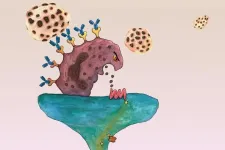(Press-News.org) Researchers have developed a DNA test to quickly identify secondary infections in COVID-19 patients, who have double the risk of developing pneumonia while on ventilation than non-COVID-19 patients.
For patients with the most severe forms of COVID-19, mechanical ventilation is often the only way to keep them alive, as doctors use anti-inflammatory therapies to treat their inflamed lungs. However, these patients are susceptible to further infections from bacteria and fungi that they may acquire while in hospital - so called 'ventilator-associated pneumonia'.
Now, a team of scientists and doctors at the University of Cambridge and Cambridge University Hospitals NHS Foundation Trust, led by Professor Gordon Dougan, Dr Vilas Navapurkar and Dr Andrew Conway Morris, have developed a simple DNA test to quickly identify these infections and target antibiotic treatment as needed.
The test, developed at Addenbrooke's hospital in collaboration with Public Health England, gives doctors the information they need to start treatment within hours rather than days, fine-tuning treatment as required and reducing the inappropriate use of antibiotics. This approach, based on higher throughput DNA testing, is being rolled out at Cambridge University Hospitals and offers a route towards better treatments for infection more generally. The results are reported in the journal Critical Care.
Patients who need mechanical ventilation are at significant risk of developing secondary pneumonia while they are in intensive care. These infections are often caused by antibiotic-resistant bacteria, and are hard to diagnose and need targeted treatment.
"Early on in the pandemic we noticed that COVID-19 patients appeared to be particularly at risk of developing secondary pneumonia, and started using a rapid diagnostic test that we had developed for just such a situation," said co-author Dr Andrew Conway Morris from Cambridge's Department of Medicine and an intensive care consultant. "Using this test, we found that patients with COVID-19 were twice as likely to develop secondary pneumonia as other patients in the same intensive care unit."
COVID-19 patients are thought to be at increased risk of infection for several reasons. Due to the amount of lung damage, these severe COVID-19 cases tend to spend more time on a ventilator than patients without COVID-19. In addition, many of these patients also have a poorly-regulated immune system, where the immune cells damage the organs, but also have impaired anti-microbial functions, increasing the risk of infection.
Normally, confirming a pneumonia diagnosis is challenging, as bacterial samples from patients need to be cultured and grown in a lab, which is time-consuming. The Cambridge test takes an alternative approach by detecting the DNA of different pathogens, which allows for faster and more accurate testing.
The test uses multiple polymerase chain reaction (PCR) which detects the DNA of the bacteria and can be done in around four hours, meaning there is no need to wait for the bacteria to grow. "Often, patients have already started to receive antobiotics before the bacteria have had time to grow in the lab," said Morris. "This means that results from cultures are often negative, whereas PCR doesn't need viable bacteria to detect - making this a more accurate test."
The test - which was developed with Dr Martin Curran, a specialist in PCR diagnostics from Public Health England's Cambridge laboratory - runs multiple PCR reactions in parallel, and can simultaneously pick up 52 different pathogens, which often infect the lungs of patients in intensive care. At the same time, it can also test for antibiotic resistance.
"We found that although patients with COVID-19 were more likely to develop secondary pneumonia, the bacteria that caused these infections were similar to those in ICU patients without COVID-19," said lead author Mailis Maes, also from the Department of Medicine. "This means that standard antibiotic protocols can be applied to COVID-19 patients."
This is one of the first times that this technology has been used in routine clinical practice and has now been approved by the hospital. The researchers anticipate that similar approaches would benefit patients if used more broadly.
INFORMATION:
This study was funded by the National Institute for Health Research Cambridge Biomedical Research Centre.
Former director of public health Professor John Ashton has said that scientific scepticism may be reinforced by the UK's rush to approve COVID vaccines for public use and the apparent political desire to be the first out of the blocks in contrast to our European neighbours.
Writing in the Journal of the Royal Society of Medicine, Prof Ashton says that to risk the trust of the public for the sake of a couple of weeks propaganda advantage could prove to be unforgivable should vaccine uptake fall below that required for the ubiquitous 'herd immunity' as a result of giving oxygen to the sceptics.
"In this age of scientific rationality, superstition and anti-science still run deep," he writes. "When an overwhelming majority of the public welcomes the arrival of ...
BOSTON - Studies with a popular laboratory model, the nematode Caenorhabditis elegans, have revealed a possible therapeutic avenue for a rare but deadly condition in which children are born without the ability to make molybdenum cofactor (Moco) on their own.
Though little known, Moco is essential for life and so far it has proven extremely difficult to stably isolate this compound in the laboratory, preventing its use as a therapeutic supplement. This new work, which appears in Genes & Development, reveals that nematodes genetically engineered to be Moco-deficient can take up Moco that is attached to several types of proteins. This suggests that such protein-Moco complexes could be used as a treatment ...
In a normal year, biologists Daniel Janzen and Winnie Hallwachs spend about six months in Costa Rica, where they conduct research and pursue conservation efforts in Área de Conservación Guanacaste (ACG), a World Heritage Site in the northwest that encompasses, a network of parks and preserves they helped establish in the 1980s and that has grown to more than 400,000 acres, including marine, dry forest, cloud forest, and rain forest environments.
In 2020 that is where the married couple was when the COVID-19 pandemic took hold of the world, and compelled them to extend their stay in the virus-free forest until the fall, when they felt safe enough to travel back to their other home in Philadelphia.
"With modern laptops and internet, we could watch the world go ...
Anthropologist Caleb Everett and former student Sihan Chen used a novel data analysis of thousands of languages, in addition to studying a unique subset of celebrities, to reveal how a soft food diet--contrasted with the diet of hunter-gatherers--is restructuring dentition and changing how people speak.
Their findings, published in Scientific Reports, counter the longstanding belief within the field that maintains that languages are susceptible to the same pressures and so are essentially immune to external factors.
"Our results represent the most compelling evidence to date that languages are very much affected by external ...
When the Thomas Fire raged through Ventura and Santa Barbara counties in December 2017, Danielle Touma, at the time an earth science researcher at Stanford, was stunned by its severity. Burning for more than a month and scorching 440 square miles, the fire was then considered the worst in California's history.
Six months later the Mendocino Complex Fire upended that record and took out 717 square miles over three months. Record-setting California wildfires have since been the norm, with five of the top 10 occurring in 2020 alone.
The disturbing trend sparked some questions for Touma, who is now a postdoctoral researcher at UC Santa Barbara's Bren School for Environmental ...
DARIEN, IL - Editors of the Journal of Clinical Sleep Medicine have identified some of the most significant articles in the publication's history, publishing new commentaries on them in a special 15th anniversary collection. The 15 commentaries from associate editors and members of the journal's editorial board describe the impact of the selected articles both at the time of their publication and today.
"The collection highlights some of the most influential publications in clinical sleep research over the past 15 years," JCSM Editor-in-Chief Dr. Nany Collop said. "These studies underscore the remarkable ...
By feeding arctic ground squirrels special diets, researchers have found that omega-3 fatty acids, common in flax seed and fish oil, help keep the animals warmer in deep hibernation.
A University of Alaska Fairbanks-led study fed ground squirrels either a diet high in omega-3s or a normal laboratory diet, and measured how the animals hibernated afterward. Researchers found that the omega-3 diet helped the animals hibernate a little warmer than normal without negatively affecting hibernation. The omega-3 diets also increased the amount of a heat-producing fat, called brown adipose tissue, the animals pack on.
The discovery could add more understanding ...
DURHAM, N.H.-- Waldenström macroglobulinemia (WM), a rare form of lymphoma, does not have any known cure and only one FDA-approved treatment making it challenging to treat patients. Researchers at the University of New Hampshire took the novel approach of targeting specific cell proteins that control DNA information using inhibitors, or drugs, that were effective in reducing the growth of the cancer cells and when combined with a third drug were even more successful in killing the WM cancer cells which could lead to more treatment options.
"This is the first study to report the promising results ...
Astronomers are winding back the clock on the expanding remains of a nearby, exploded star. By using NASA's Hubble Space Telescope, they retraced the speedy shrapnel from the blast to calculate a more accurate estimate of the location and time of the stellar detonation.
The victim is a star that exploded long ago in the Small Magellanic Cloud, a satellite galaxy to our Milky Way. The doomed star left behind an expanding, gaseous corpse, a supernova remnant named 1E 0102.2-7219, which NASA's Einstein Observatory first discovered in X-rays. Like detectives, researchers sifted through archival images taken by Hubble, analyzing visible-light observations made 10 years apart.
The research team, led by John Banovetz and Danny Milisavljevic ...
In addition to a skin rash, many eczema sufferers also experience chronic itching, but sometimes that itching can become torturous. Worse, antihistamines -- the standard treatment for itching and allergy -- often don't help.
New research from Washington University School of Medicine in St. Louis indicates that allergens in the environment often are to blame for episodes of acute itch in eczema patients, and that the itching often doesn't respond to antihistamines because the itch signals are being carried to the brain along a previously unrecognized pathway that current drugs don't target.
The new findings, published ...


